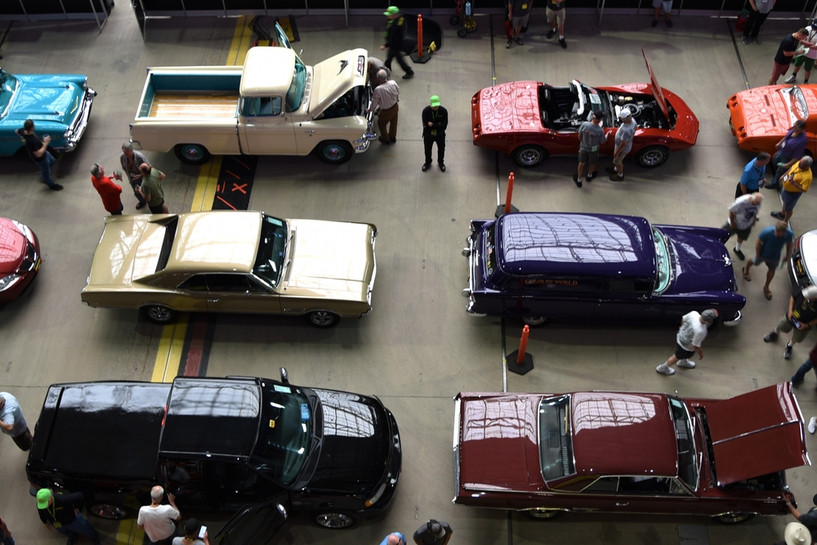In part one of this two-part blog mini-series, we went over some of the key factors to be considering if you're attending a classic car auction to purchase one or more vehicles. What about if you're on the flip side of this coin, however, and looking to sell one or more classic cars within an auction setting?
At Andersen Restoration Parts, we're happy to help classic car owners with a huge range of restoration parts, whether you're preparing for an upcoming sale or utilizing restorations for any other purpose. We offer everything from ball joint sets and idler arms to suspension rebuild kits and more, ensuring your vehicle is in great shape for any need. Switching gears today, let's look at some important preparation tips for those who plan to sell a vehicle at a classic car auction, ensuring you get great value during your sale.
Choosing the Proper Auction
One of the most important parts of selling a classic car at auction actually happens well before the auction itself. First, you'll want to be sure that you choose an auction that caters to vehicles of your make and model - a classic car show might not receive as much attention from buyers who are more interested in muscle cars or European models. By selecting an auction that will have more classic car regulars, you can ensure better value for your vehicle.
Down related lines, be thinking about the range of vehicles that will be appearing at the auction and look for an auction where your car will stand out from the competition. If there are a number of cars with similar specs, it might make sense to wait and attend another auction with more variety on hand.
You should also be confirming the reputation and history of any auction that you plan to attend. Some auctions might have a reputation for under-pricing vehicles, while others may not offer enough in terms of buyer attention or variety. Make sure you research the particular auction house and ask around to ensure it's the right spot for your classic car sale.
Cleaning Up Your Vehicle
Once you've chosen the right auction, it's time to start getting your vehicle ready for sale. This includes a thorough cleaning and detailing job that should be done well before you plan to attend the auction. You'll want to make sure everything is spotless inside and out, as any dirt or grime will only detract from its value and may even distract potential buyers from the vehicle's features.
They say that first impressions are everything, and that's especially true in a classic car auction. In addition to giving the vehicle a full wash-down, you might also want to consider polishing and waxing it for an extra shine that could be the difference between a sale and no sale.
Vehicle History Report
Whether or not it's a requirement of your auction to provide one, it's always a good idea to put together a vehicle history report for potential buyers. This should include information about the vehicle's recent maintenance and repair work, as well as its title history over time.
The more detailed this report is, the better chance you'll have at selling your classic car quickly - buyers will feel secure in knowing what they're getting and won't have to worry about hidden surprises.
Setting a Reserve Price
Within an auction setting, a reserve price refers to the minimum amount that you're willing to accept for your classic car. This should be a realistic figure that allows you some margin between what your vehicle is worth and what it will cost to cover any restoration or repair work that you might have done prior to the sale.
Be sure to discuss this reserve price with other sellers who may have attended previous auctions and get their feedback on what a reasonable figure should be. Consider the “market value” of similar vehicles, as well as what you've spent in order to bring it up to its current state.
Consider a Transport Service
Depending on the auction house, you might be able to take advantage of a transport service that can help move your classic car from its current location to where the auction will be held. This is especially useful if you're selling multiple vehicles at once or don't have the ability to drive them yourself.
Be sure to research different transport services and compare their rates in order to ensure you’re getting the best deal.
Know Auction Rules and Etiquette
Finally, it's always a good idea to familiarize yourself with the rules and etiquette of the auction before you attend. This includes confirming what paperwork is required for the sale, as well as any fees that will be associated with it.
It's also important to understand the rules of bidding and when you should step in to start negotiations with potential buyers. Knowing this will help to ensure that you get the best price for your classic car and come away from the auction feeling satisfied.
Following these tips should put you in the best position to sell your classic car at an auction, allowing you to get a fair deal and move on with your automotive adventures. Good luck!
At Andersen Restoration Parts, we specialize in helping you find the parts you need to keep your classic car running smoothly. Check out our extensive selection of restoration parts now and start restoring your vehicle today!

